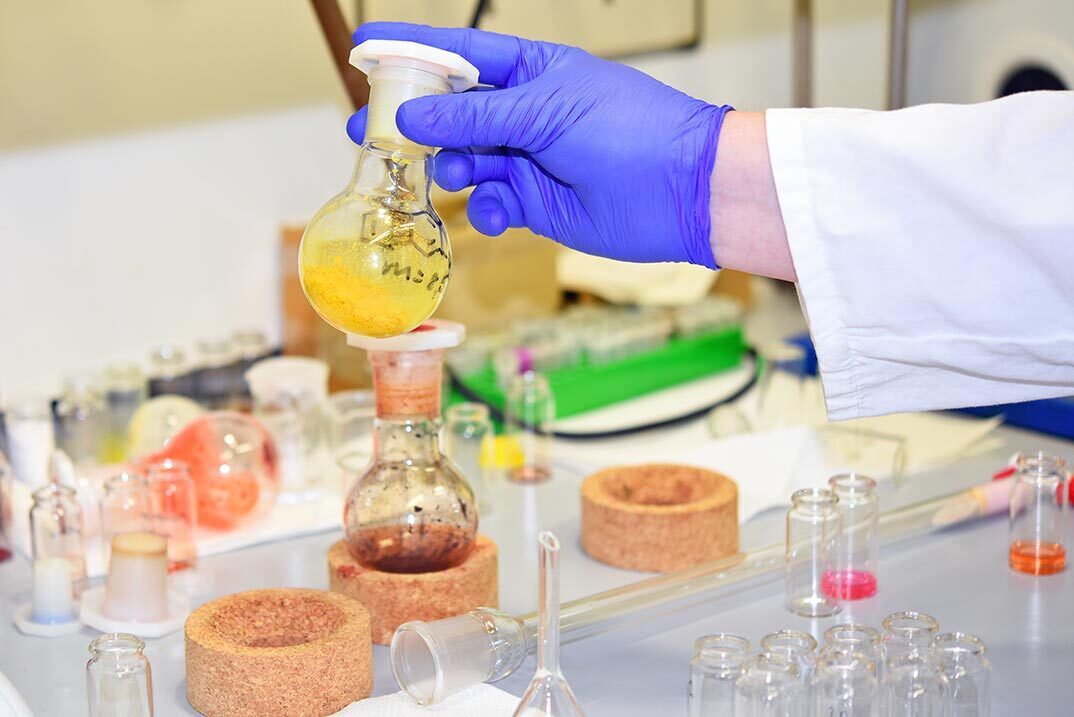Subtotal:
£36.49
Course Curriculum
| Unit 01: ABOUT THE COURSE | |||
| Learning objectives | 00:10:00 | ||
| Example of a solved problem | 00:06:00 | ||
| Unit 02: Quantities and Units | |||
| System of measurement | 00:02:00 | ||
| International system of units | 00:05:00 | ||
| Temperature units and scales | 00:04:00 | ||
| Use and misuse of units | 00:03:00 | ||
| Dimensional analysis | 00:03:00 | ||
| Quantities and units: Solved problems | 00:10:00 | ||
| Unit 03: Atomic, Molecular and Molar Masses | |||
| Atoms | 00:02:00 | ||
| Nuclei | 00:04:00 | ||
| Periodic table | 00:08:00 | ||
| Relative atomic masses | 00:04:00 | ||
| Moles | 00:05:00 | ||
| Symbols, formulas and molar masses | 00:04:00 | ||
| Atomic, molecular and molar masses – Problems with solutions | 00:16:00 | ||
| Unit 04: Formulas and Compositions | |||
| Empirical formula from composition | 00:04:00 | ||
| Composition from formula | 00:04:00 | ||
| Nuclidic molecular masses and chemical formulas | 00:05:00 | ||
| Formulas and compositions: Solved problems | 00:24:00 | ||
| Unit 05: Inorganic Nomenclature | |||
| Introduction to nomenclature | 00:03:00 | ||
| Naming binary compounds of nonmetals | 00:05:00 | ||
| Naming ionic compounds | 00:01:00 | ||
| Naming monoatomic cations | 00:06:00 | ||
| Naming polyatomic cations | 00:03:00 | ||
| Naming monoatomic anions | 00:02:00 | ||
| Naming oxyanions | 00:05:00 | ||
| Naming special anions | 00:01:00 | ||
| Putting the names of the ions together | 00:02:00 | ||
| Writing formulas for ionic compounds | 00:08:00 | ||
| Naming inorganic acids | 00:06:00 | ||
| Naming acid salts | 00:04:00 | ||
| Naming hydrates | 00:01:00 | ||
| Unit 06: Chemical Equations | |||
| Introduction to chemical equations | 00:02:00 | ||
| Molecular relations from equations | 00:05:00 | ||
| Mass relations from equations | 00:06:00 | ||
| Limiting reactant | 00:01:00 | ||
| Calculations from chemical equations: Solved problems | 00:24:00 | ||
| Types of chemical reactions | 00:04:00 | ||
| Unit 07: Measurement of Gases | |||
| Pressure | 00:07:00 | ||
| Gas laws | 00:02:00 | ||
| Boyle’s law: Constant temperature | 00:01:00 | ||
| Charles’ law: Constant pressure | 00:01:00 | ||
| Gay-Lussac’s law: Constant volume | 00:01:00 | ||
| Combined gas law | 00:01:00 | ||
| Density of an ideal gas | 00:03:00 | ||
| Dalton’s law for partial pressures | 00:01:00 | ||
| Collecting a gas over a liquid | 00:02:00 | ||
| Deviation from ideal beahvior | 00:01:00 | ||
| Measurement of gases: Solved problems | 00:13:00 | ||
| Unit 08: The Ideal Gas Law | |||
| Avogadro’s hypothesis | 00:03:00 | ||
| Molar volume | 00:01:00 | ||
| Ideal gas law | 00:05:00 | ||
| Gas volume relations from equations | 00:04:00 | ||
| Gas stoichiometry involving mass | 00:05:00 | ||
| The ideal gas law: Solved problems | 00:13:00 | ||
| Unit 09: Thermochemistry | |||
| Heat | 00:04:00 | ||
| Energy and enthalpy | 00:05:00 | ||
| Enthalpy changes for various processes | 00:12:00 | ||
| Rules of thermochemistry | 00:09:00 | ||
| Thermochemistry – Problems with solutions | 00:21:00 | ||
| Unit 10: Atomic Structure | |||
| Characters of light | 00:05:00 | ||
| Interaction of light with matter | 00:08:00 | ||
| Particles and waves | 00:03:00 | ||
| Orbitals | 00:17:00 | ||
| The Pauli exclusion principle | 00:01:00 | ||
| Aufbau principle | 00:03:00 | ||
| Electron configuration | 00:11:00 | ||
| Atomic radii | 00:04:00 | ||
| Ionization energies | 00:03:00 | ||
| Electron affinity and magnetic properties | 00:05:00 | ||
| Atomic structure – Problems with solutions | 00:16:00 | ||
| Unit 11: Chemical Bonding and Molecular Structure | |||
| Introduction to chemical bonding | 00:02:00 | ||
| Octet rule | 00:03:00 | ||
| Ionic bonding | 00:09:00 | ||
| Electron dot notation | 00:05:00 | ||
| Covalent bonding | 00:17:00 | ||
| Distinction between ionic and covalent bonding | 00:03:00 | ||
| Predicting the nature of bonding in compounds | 00:05:00 | ||
| Formal charges | 00:08:00 | ||
| Dipole moment and electronegativity | 00:04:00 | ||
| Hybrid orbitals | 00:10:00 | ||
| Unit 12: Solids and Liquids | |||
| Crystals | 00:08:00 | ||
| Close packing | 00:04:00 | ||
| Crystal forces | 00:06:00 | ||
| Liquid forces | 00:03:00 | ||
| Solids and liquids: Solved problems | 00:22:00 | ||
| Unit 13: Oxidation - Reduction | |||
| Introduction to redox reactions | 00:04:00 | ||
| Oxidation number | 00:09:00 | ||
| Oxidizing and reducing agents | 00:05:00 | ||
| Ionic notation for equations | 00:04:00 | ||
| Balancing oxidation-reduction equations | 00:11:00 | ||
| Oxidation-reduction: Solved problems | 00:14:00 | ||
| Unit 14: Concentration of Solutions | |||
| Composition of solutions | 00:01:00 | ||
| Concentrations | 00:02:00 | ||
| Molarity | 00:02:00 | ||
| Normality | 00:05:00 | ||
| Molality | 00:01:00 | ||
| Mole fraction | 00:01:00 | ||
| Comparison and summary of the concentration units | 00:04:00 | ||
| Dilution problems | 00:01:00 | ||
| Concentration of solutions: Solved problems | 00:14:00 | ||
| Unit 15: Reaction Involving Standard Solutions | |||
| Reactions involving standard solutions | 00:04:00 | ||
| Reaction involving standard solutions: Solved problems | 00:13:00 | ||
| Unit 16: Properties of Solutions | |||
| Introduction to chemical solutions | 00:02:00 | ||
| Vapor pressure lowering | 00:04:00 | ||
| Freezing point lowering | 00:05:00 | ||
| Boiling point lowering | 00:03:00 | ||
| Osmotic pressure | 00:03:00 | ||
| Solution of gases in liquids | 00:02:00 | ||
| Law of distribution | 00:01:00 | ||
| Properties of solutions: Solved problems | 00:13:00 | ||
| Unit 17: Thermodynamics | |||
| The first law | 00:02:00 | ||
| The second law | 00:06:00 | ||
| Entropy | 00:04:00 | ||
| The third law | 00:01:00 | ||
| Standard states | 00:06:00 | ||
| Chemical equilibrium | 00:03:00 | ||
| The equilibrium constant | 00:10:00 | ||
| Le Chatelier’s principle | 00:14:00 | ||
| Thermodynamics – Problems with solutions | 00:18:00 | ||
| Unit 18: Acids and Bases | |||
| Arrhenius concept | 00:03:00 | ||
| Brönsted-Lowry concept | 00:08:00 | ||
| Lewis concept | 00:02:00 | ||
| Ionization of water | 00:07:00 | ||
| Hydrolysis | 00:06:00 | ||
| Buffer solutions | 00:06:00 | ||
| Indicators | 00:03:00 | ||
| Polytropic acids | 00:05:00 | ||
| Titration | 00:08:00 | ||
| Acids and bases – Problems with solutions | 00:21:00 | ||
| Unit 19: Complex Ions and Precipitates | |||
| Coordination complexes | 00:08:00 | ||
| Solubility product | 00:02:00 | ||
| Precipitation | 00:05:00 | ||
| Complex ions and precipitates: Solved problems | 00:06:00 | ||
| Unit 20: Electrochemistry | |||
| Electrical units | 00:03:00 | ||
| Faraday’s laws | 00:04:00 | ||
| Voltaic cells | 00:06:00 | ||
| Standard half-cell potential | 00:07:00 | ||
| Combining couples | 00:04:00 | ||
| Free energy and Nernst equation | 00:08:00 | ||
| Electrolysis | 00:06:00 | ||
| Electrochemistry: Solved problems | 00:16:00 | ||
| Unit 21: Rates of Reactions | |||
| Introduction to rates of reactions | 00:01:00 | ||
| Rate constants and order of reactions | 00:11:00 | ||
| First order reactions | 00:02:00 | ||
| Other rate laws | 00:01:00 | ||
| Energy of activation | 00:01:00 | ||
| Mechanism of reaction: Molecularity | 00:05:00 | ||
| Mechanism of reaction: Energetics | 00:05:00 | ||
| Rates of reactions: Solved problems | 00:13:00 | ||
Review
COURSE REVIEWS
Course Reviews
No Reviews found for this course.






 EXTENDED OFFER ENDS IN
EXTENDED OFFER ENDS IN




